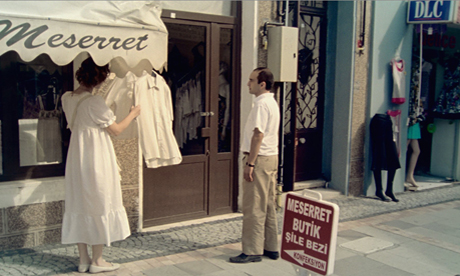Review: London Turkish Film Festival

Wrong Rosary (Uzak Ihtimal) by Mahmut Fazil Coskun
Wrong Rosary (Uzak Ihtimal) by Mahmut Fazil Coskun at the Rio Cinema, Sun 8 November
The Bogeyman (Mommo-Kizkardesim) by Atalay Tasdiken at the Apollo, Piccadilly Circus
Taking a single strand from amid the bustle of Istanbul, Mahmut Fazil Coskun impresses with his first feature, Wrong Rosary. Musa, a naïve Muezzin, is smitten with his Catholic neighbour Clara after she rescues him from a broken lift, carrying a candle a la Florence Nightingale.
Musa later comes to work for Yakup, a bookseller with his own interest in Clara. As their three lives interlace, their interactions are most visible in absence: the spaces and pauses that divide them betray the feelings they are too repressed to act upon.
The camera throws these moments into harsh relief, often lingering on the hands, or withdrawing to observe furtively from a distance. Coskun’s relentless objectivity reins in a script that threatens to teeter over into sentimentality, and the frenetic pace at which he leaps from scene to scene means the sudden denouement, final and yet unfulfilled, packs a serious emotional punch.
An inevitability also runs through Atalay Tasdiken’s The Bogeyman, which otherwise contrasts in its languorous cinematography and – compared to Rosary’s muted tones – absolute revelation in colour. Events take place in a small village, where the young Ahmet must watch over his younger sister Ayşe after their craven father remarries and abandons them to their loving but ailing grandfather.
The ‘bogeyman’, whose malign existence inhabits the recesses of the storeroom and their imaginations, is a cutting and constant reminder of their childhood, while far more real and pressing worries pass over their heads.
Tasdiken uses mostly non-professional actors, whose rawness can jar at times, but it’s a small flaw in a beautifully directed film. There are scenes that stick indelibly in the memory, perhaps none more than the first, a long, wordless fixed-camera scene in which a donkey cart is loaded in blazing sun. The two children are revealed only when the cart rattles away, carrying their father. Showing more in twenty seconds than pages of dialogue could tell, it’s masterful film-making.
The better work, Bogeyman inevitably relies on the performances of the two children, who do not disappoint. Though both are admirable, it is Elif Bülbül as Ayşe whose wide-eyed credulity centres the film, so much that in the final act, a simple haircut becomes a moment of profound sorrow, with this correspondent reaching for his ‘kerchief.
More from the London Turkish Film Festival.
